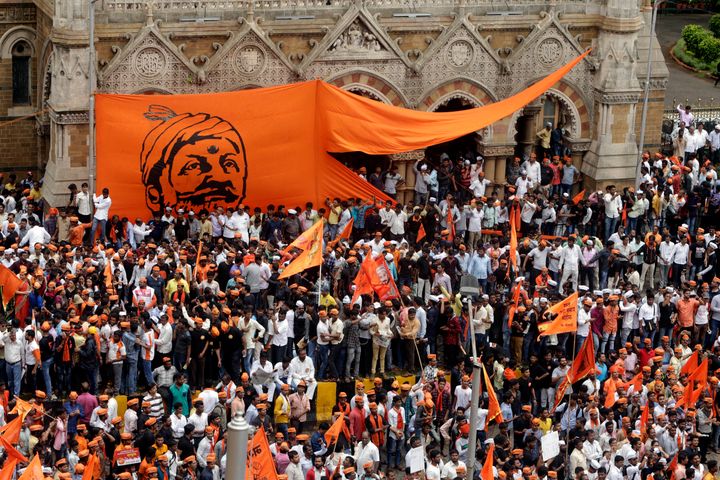Anadi Tewari
The Constitution bench of the Supreme Court today in a batch of pleas challenging the constitutional validity of the Maharashtra State Reservation For Socially and Educationally Backward Classes Act, 2018, has declared this Maratha Reservation Law as unconstitutional since it exceeds the 50% ceiling limit of granting reservation and is violative of Articles 14 and 15 of the Constitution.
The bench of Justices Ashok Bhushan, L. Nageswara Rao, S. Abdul Nazeer, Hemant Gupta and S. Ravindra Bhat further upholds the 9-judges bench decision in Indira Sawhney v. Union of India and ruled that there exists no need to refer the judgment to a larger bench since it is already accepted in several previous cases and setting a ceiling limit of 50% reservation is by nature a good law.
“There exist no exceptional and extraordinary circumstances for granting reservation exceeding 50% to the Maratha community and therefore, this reservation law violates Article 14 of the Constitution,” the Court remarked.
“The Gaikwad Commission headed by Justice Gaikwad has not made out any scenario to prove that the Maratha Community classify as socially and economically backward one to allow the existence of exceptional and extraordinary circumstances,” the Court further stated.
The bench has also dismissed the pleas challenging the 102nd Constitution Amendment Act, 2018 as being violative of the basic structure of the Constitution.
The Supreme Court while strucking down the reservation given to the Marathas in jobs and education, has clarified that the judgment will not admit the PG Medical Admissions under Maratha quota made till 09 September 2020.
The Court had reserved previously its judgment on March 26 after hearing the parties continuously for over 10 days.
As per the cause list on the Supreme Court’s website, Justices Ashok Bhushan, L. Nageswara Rao, Hemant Gupta and S. Ravindra Bhat have written the judgement in this case.
Background of the Case
The Maharashtra State Reservation For Socially and Educationally Backward Classes Act, 2018 seeks to grant 16% reservation to the Maratha community in educational institutions and government jobs.
In the year 2019, the Bombay High Court while dismissing the petition challenging the constitutional validity of the foregoing Maratha Reservation Act, also noted that the 16% reservation granted is not justiciable and had reduced the quota to 12% in educational institutions and 13% in jobs as recommended by the Backward Commission.
“If in exercise of its duty which is enjoined on the State, the State makes a sincere attempt to achieve such a social order ensuring welfare of a section of people, can it note be said that the situation prevalent in the State of Maharashtra and the endeavour of the State to taken steps for upliftment of the Maratha community falls within the exceptional and extraordinary circumstances,” the Bombay High Court remarked in its order.
Appeals were filed before the Supreme Court challenging the judgment passed by the Bombay High Court judgment and challenges the Maratha Reservation Act in the sense that it breaches the 50% reservation threshold prescribed in the 1992 judgment of Indira Sawhney v. Union of India. The 9-judges bench decision held that Article 16(4) of the Constitution does not grant reservation in promotion because it pertains only to the reservation in appointments. In this judgment, the Court has drawn a ‘Lakshman Rekha’ for reservation in education and jobs to 50% except in extraordinary circumstances.
Various States governments including the Maharashtra government had urged the Supreme Court to reconsider Indra Sawhney saying that there was considerable divergence in views among the judges on the Bench in Indra Sawhney and the 50% cap was decided without cogent data.
The Supreme Court bench was also urged by the State Government that the 1992 Indira Sawhney’s judgment needs to have a re-look, and if that is so the Court then has to ideally refer the same to an 11-judges bench.
Arguments In the Case
The Constitution bench of the Supreme Court had commenced hearing arguments in the matter on March 15.
The Centre had argued that Maharashtra has the legislative competence for granting reservation to Marathas and its decision is Constitutional as the 102nd amendment does not denude a state of the power to declare its list of Socially and Educationally Backward Classes (SEBC). The 102nd Constitution Amendment Act of 2018 inserted Articles 338B, which deals with the structure, duties and powers of the National Commission for Backward Class (NCBC), and 342A dealing with the power of the President to notify a particular caste as SEBC as also of Parliament to change the list.
The Supreme Court also discussed whether the Maharasthra State Backward Commission under the chairmanship of Justice N.G. Gaikwad had made up the case of extraordinary circumstances suffered by the Maratha Community, requiring the helping hand of reservation even at the cost of exceeding 50% reservation cap.
Earlier on September 9, 2020, the Supreme Court had stayed the implementation of the Maratha legislation and referred the matter to a larger bench. The court, however, made it clear that the status of those who have availed of the benefits will not be disturbed.
Case Details: Jaishri Laxmanrao Patil v. Chief Minister and Others [C.A. No. 003123 of 2020]
Click Here To Download The Judgment

